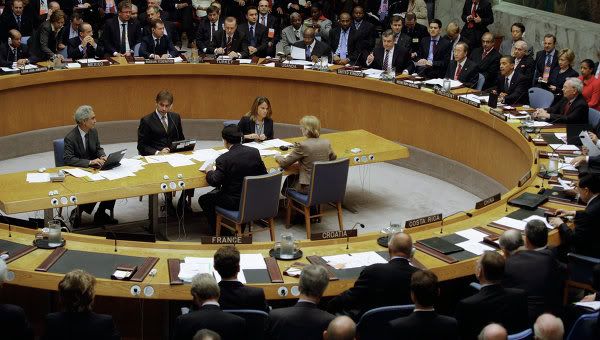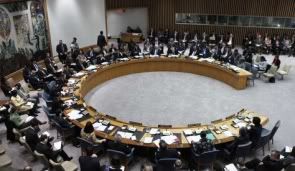

The United States, moving firmly away from the Obama administration’s previous emphasis on wooing Iran, pushed through a new round of United Nations sanctions against the nation on Wednesday, taking aim at its military in yet another attempt to pressure Tehran over its nuclear program.
The new sanctions, a modest increase from previous rounds, took months to negotiate but still did not carry the symbolic weight of a unanimous Security Council decision. Twelve of the 15 nations voted for the measure, while Turkey and Brazil voted against and Lebanon abstained.
Beyond the restrictions imposed by the sanctions themselves, the vote sets stage for harsher measures that the United States and the European Union have promised to enact on their own once they had the imprimatur of the United Nations. European leaders are likely to discuss new measures at a summit in mid June.
Iran has defied repeated demands from the Security Council to stop enriching nuclear fuel. It has built new, sometimes secret, centrifuge plants needed to enrich uranium — and has enriched it at higher levels. These actions have raised suspicions in the West that Iran is pursuing a nuclear weapon, although leaders in Tehran insist their nuclear program is peaceful.
Susan E. Rice, the United States ambassador to the United Nations, said the body had “risen to its responsibilities” by approving the measure, and that “now Iran should choose a wiser course.”
“Until the world’s concerns with Iran’s nuclear defiance are fully resolved, we must work together to ensure that the sanctions in this resolution are fully and firmly implemented,” she told the Security Council after the vote.
Diplomats from Brazil and Turkey, which negotiated a deal with Iran last month to send some of its low-enriched uranium abroad in exchange for access to fuel for a medical reactor, criticized the sanctions, saying they could undermine further attempts at diplomacy.
Maria Luiza Ribeiro Viotti, Brazil’s representative to the United Nations, said “we do not see sanctions as an effective instrument in this case.”
The five permanent Security Council nations that negotiated the new sanctions — Britain, China, France, Russia and the United States — along with Germany, also left the door open to new diplomacy. The resolution contained the full text of a 2008 offer for increased civilian nuclear cooperation in exchange for Iran stopping enrichment.
The main thrust of the sanctions is against military, trade and financial transactions carried out by the Islamic Revolutionary Guards Corps, which controls the nuclear program and has taken a more central role in running the country and the economy.
The sanctions ratchet up the measures previously taken against 40 individuals, putting them under a travel ban and asset freeze, but adds just one name to the list — Javad Rahiqi, 56, the head of the Isfahan Nuclear Technology Center.
The sanctions require countries to inspect ships or planes headed to or from Iran if they suspect banned cargo is aboard, but there is no authorization to board ships forcefully at sea. Another added element bars all countries from allowing Iran to invest in nuclear enrichment plants, uranium mines and other nuclear-related technology.
The United States had sought broader measures against Iranian banks, its insurance industry and other trade, but China and Russia were adamant that the sanctions not affect Iran’s day-to-day economy. Washington and Beijing were wrangling down to the last day over which banks to include on the list, diplomats said, and in the end only one appeared on the list of 40 new companies to be blacklisted.
Even after China agreed to negotiate with the other Security Council members, its opening position opposed any new sanctions, said a United States official involved in the negotiations. That stance meant new measures took months to negotiate and required significant concessions by the United States. “With time we got a resolution that we felt was very meaningful and credible and significant,” Ms. Rice said in an interview before the vote. “But had we wanted a low ball, low impact resolution we could have had that in a very short period of time.”
In the end, both the energy sector and the Central Bank were mentioned with somewhat tortured wording in the opening paragraphs. That is enough to pursue companies dealing with both, American officials said.
The sanctions include a ban on selling heavy weapons to Iran, including battle tanks, armored combat vehicles, large caliber artillery systems, combat aircraft, attack helicopters, warships, missiles and missile systems.
But so far, three previous rounds of sanctions have failed to halt Iran’s nuclear ambitions, leading some skeptics to question whether the latest measures would be able to apply real pressure on Tehran.
“Nobody is suggesting that these sanctions are not going to have an impact, said Ray Takeyh, an Iran expert at the Council on Foreign Relations and former State Department adviser on the Gulf. “The question is whether they will put sufficient pressure on Iran to come back to the negotiating table in a more earnest and a more compromising mood.” Mr. Takeyh questioned whether measures like the weapons ban could have the unintended consequence of driving Iran toward developing a nuclear weapon because it cannot get other arms. Iran has enough low-enriched uranium for two bombs.
Even restricting a few dozen additional companies seemed unlikely to cause serious pressure given the size and growth of the oil-rich Iranian economy.
“It would seem like a thin reed on which to base a policy,” said Steven E. Miller, the director of the International Security Program at Harvard University’s Belfer Center for Science and International Affairs. “I think that by default we end up with sanctions because we don’t know what else to do.”
Indeed, studies by the United States government have questioned the efficacy of sanctions, especially given Iran’s weight as an oil exporter. Iran will likely be able to use its oil and other important trade to blunt the latest measures.
Accurate trade figures are hard to pin down exactly because Iran ships billions of dollars of goods each year through Dubai in the United Arab Emirates. But China is believed to have surpassed the European Union as the Iran’s major trade partner with exchanges surpassing the E.U.’s $35 billion.
China imports some 11 percent of its oil needs from Iran and has signed more than $120 billion in oil industry deals in recent years. At one point Iran imported some 40 percent of its refined gasoline needs, but it has been reducing that through deals with China to expand its refining capacity and by signing agreements with countries like Venezuela.
The World Trade Organization’s Web site indicates that other major buyers of Iranian exports include Japan, Taiwan the European Union, China and India.
“Not too shabby for an alleged pariah state,” said Mr. Miller. “It does sort of raise the question of who exactly we are persuading with our relentless campaign to isolate Iran.”





0 comments:
Post a Comment